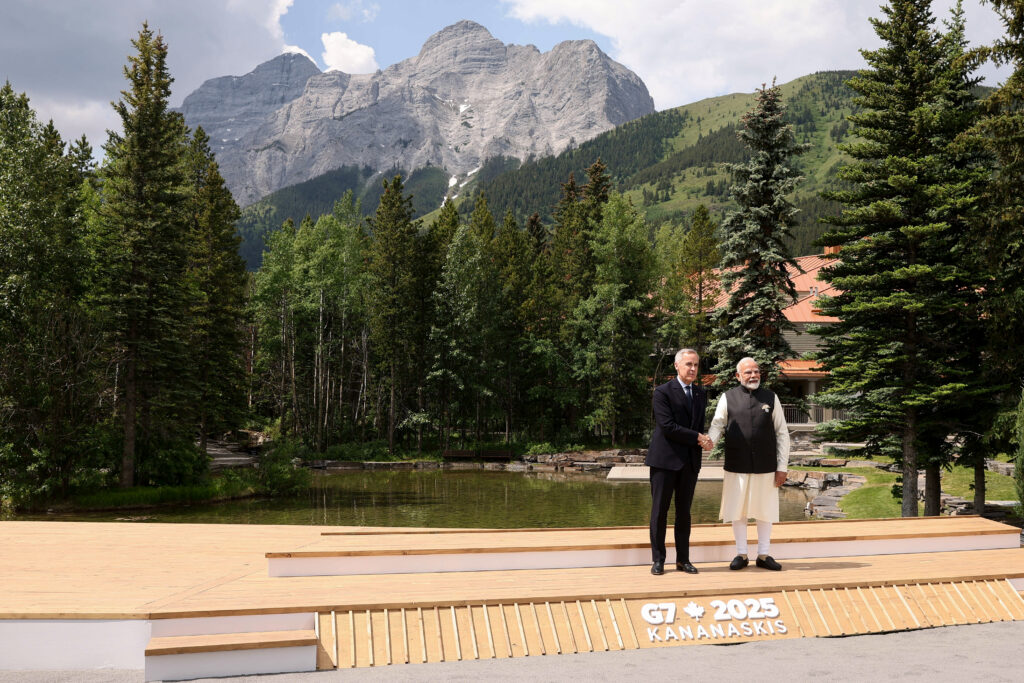Indian Prime Minister Narendra Modi voiced hope Tuesday for improved cooperation with Canada as he met his new counterpart Mark Carney, following a bitter spat over New Delhi’s alleged involvement in an assassination. Carney, who took office in March, invited Modi to the Canadian Rockies as a guest of the Group of Seven major economies.Carney’s predecessor Justin Trudeau last year publicly accused India of involvement in the assassination of a Sikh separatist on Canadian soil and expelled the Indian ambassador, triggering a furious reciprocal response from India.Modi took a conciliatory tone as he met Carney at a remote mountain lodge, saying: “The relationship between India and Canada is very important in many ways.””Dedicated to democratic values, Canada and India will strengthen democracy together, and strengthen humanity,” he said.He congratulated Carney on guiding his Liberal Party to an election victory and said: “I am confident that together with him India and Canada will work together to make progress in many areas.”Carney said it was a “great honor” to welcome Modi to the G7 summit but made a passing allusion to the domestically sensitive row with a reference to “transnational repression.”Carney said he hoped to work with India on “the issues that we look to tackle together, from energy security… the future of artificial intelligence, to the fight that we have against transnational repression and against terrorism.”Canada is home to the largest Sikh population outside India and the community has exerted growing political influence.Hardeep Singh Nijjar, a naturalized Canadian citizen who advocated for an independent Sikh state called Khalistan, was shot dead in the parking lot of a Sikh temple in British Columbia in 2023.Trudeau accused India of direct involvement. Canada has accused India of directing a broad campaign targeting Sikh activists on Canadian soil, which Ottawa says has included intimidation, threats and violence. India denied involvement in the killing and said that Canada should take more action against violent advocates for Khalistan, which has been reduced to a fringe movement inside India.
Indian Prime Minister Narendra Modi voiced hope Tuesday for improved cooperation with Canada as he met his new counterpart Mark Carney, following a bitter spat over New Delhi’s alleged involvement in an assassination. Carney, who took office in March, invited Modi to the Canadian Rockies as a guest of the Group of Seven major economies.Carney’s predecessor Justin Trudeau last year publicly accused India of involvement in the assassination of a Sikh separatist on Canadian soil and expelled the Indian ambassador, triggering a furious reciprocal response from India.Modi took a conciliatory tone as he met Carney at a remote mountain lodge, saying: “The relationship between India and Canada is very important in many ways.””Dedicated to democratic values, Canada and India will strengthen democracy together, and strengthen humanity,” he said.He congratulated Carney on guiding his Liberal Party to an election victory and said: “I am confident that together with him India and Canada will work together to make progress in many areas.”Carney said it was a “great honor” to welcome Modi to the G7 summit but made a passing allusion to the domestically sensitive row with a reference to “transnational repression.”Carney said he hoped to work with India on “the issues that we look to tackle together, from energy security… the future of artificial intelligence, to the fight that we have against transnational repression and against terrorism.”Canada is home to the largest Sikh population outside India and the community has exerted growing political influence.Hardeep Singh Nijjar, a naturalized Canadian citizen who advocated for an independent Sikh state called Khalistan, was shot dead in the parking lot of a Sikh temple in British Columbia in 2023.Trudeau accused India of direct involvement. Canada has accused India of directing a broad campaign targeting Sikh activists on Canadian soil, which Ottawa says has included intimidation, threats and violence. India denied involvement in the killing and said that Canada should take more action against violent advocates for Khalistan, which has been reduced to a fringe movement inside India.
